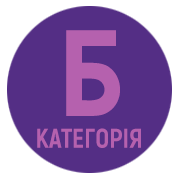DEVELOPMENT OF THE MOTOR SPHERE OF CHILDREN WITH INTELLECTUAL DISABILITIES WITH THE PARTICIPATION OF FAMILIES
DOI:
https://doi.org/10.32782/inclusion/2024.4.4Keywords:
development, motor sphere; children with intellectual disabilities; health, socialization, familyAbstract
The article identifies the peculiarities of the development of the motor sphere of children with intellectual disabilities with the participation of the family. It is emphasized that in a family where there is understanding, good traditions, a conscious attitude to the child's health, parents themselves create conditions for its development. These are family and household forms of recreation: morning gymnastics exercises combined with hardening and home swimming, active and sedentary games, corrective and developmental games at the home stadium, and outdoor walks at any time of the year. Among the proposed forms of work, the central place is occupied by practical classes for children together with their parents. Joint parent-child activities are organized in such a way that parents can see not only their own children, but also ‘other people's’ children. Such a shift in attention radically changes the psychology of parents. They begin to understand, compare, participate, and help other children. At the same time, a new collective mindset is formed, based on a common goal, mutual understanding, establishing contacts between children, parents, families, sharing experiences, and getting to know each other. Informal relationships, joint physical exercises, role-playing games, fairy tale games, composition games, and the process of learning movements require active participation, imagination, and creativity. Anticipation of the results of this process creates a positive emotional shift, interest, and confidence in the usefulness of this activity for both yourself and your children. An important aspect of cooperation with families raising children with intellectual disabilities is the creation of public associations of parents of such children. Thus, gradually mastering more and more movements, parents independently come to the realization that motor activity expands the child's capabilities, enriches him/her with motor skills, games that can be played at home and on the street with other family members and other children.
References
Висоцька А. М. Організація корекційно-виховних занять із розумово відсталими школярами. Дефектологія. 2012. № 1. С. 14–17.
Гаврилов О. В. Особливі діти в закладі і соціальному середовищі: навч. посіб. Кам’янець-Подільський : Аксіома, 2009. 308 с.
Колишкін О. В. Корекційна освіта : вступ до спеціальності : навч. посіб. Суми : Університетська книга, 2013. 392 с.
Колишкін О. В. Теоретико-практичні основи адаптивної фізичної культури : навч. посіб. Суми : СумДПУ імені А. С. Макаренка, 2014. 425 с.
Миронова С. П. Олігофренопедагогіка. Компактний навчальний курс : навч. посіб. Камянець-Подільський : К-ПНУ імені І. Огієнка, 2008. 204 с.
Основи корекційної педагогіки: навч. посіб. /С. П. Миронова, О. В. Гаврилов, М. П. Матвєєва; за заг. ред. С. П. Миронової. Кам’янець-Подільський: К-ПНУ імені І. Огієнка, 2010. 264 с.
Синьов В. М. Корекційна психопедагогіка. Олігофренопедагогіка : підруч. К. : НПУ імені М. П. Драгоманова, 2007. Частина І. 238 с.
Спеціальна психологія : навч. посіб. для студентів спец. 6.010105 – «Корекційна освіта» / Н. Г. Пахомова, М. М. Кононова; Полтав. нац. пед. ун-т імені В. Г. Короленка. Полтава : АСМІ, 2015. 359 c.
Створення індивідуальної програми розвитку для дітей з особливими освітніми потребами : метод. посіб. / під заг. ред. Н. З. Софій. К. : ТОВ «Видавничий дім «Плеяди», 2015. 66 с.
Шиян Б. М. Теорія і методика фізичного виховання школярів. Частина 1. Тернопіль : Навчальна книга-Богдан, 2001. 272 с.







